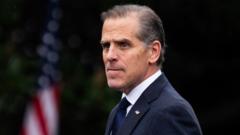**Despite potential economic fallout, many in this small town continue to support the president's vision for American industry.**
**Trump Tariffs Spark Divided Sentiments in Ohio's Delta**

**Trump Tariffs Spark Divided Sentiments in Ohio's Delta**
**As Delta, Ohio navigates the impact of new tariffs, local residents express mixed feelings towards Trump’s trade policies.**
In Delta, Ohio, a small industrial town marked by countless Trump flags and patriotic displays, the unveiling of new tariffs by President Trump has elicited varied reactions from local residents. With the Republican ticket having triumphed by nearly two-to-one in the last presidential election, it is evident that Trump’s policies still resonate deeply in the area.
Trump's recent proposal to impose tariffs ranging from 10% to 50% on nearly all imports has left many apprehensive about potential price hikes for American consumers. Nevertheless, many Delta residents stand by Trump's assertions that these tariffs will level the international playing field, bolster U.S. manufacturing, and increase government revenue.
Mary Miller, the owner of a local sweet shop, shared her support for the tariffs, citing her belief that foreign nations are not playing fair in trade. As she reflects on a past experience of American manufacturers relocating overseas, she remains willing to endure higher prices for the sake of fair competition. "Sometimes you have to walk through fire to get to the other side," she remarked, implying that reviving American industry may warrant short-term sacrifices.
Delta, home to approximately 3,300 residents and situated less than 100 miles south of Detroit, mirrors a broader Midwestern sentiment of cautious optimism amid possible economic disruptions. While experts warn of significant repercussions—particularly in sectors with complex supply chains such as automobiles—workers in the local steel industry have shown a mix of laughter and indifference when discussing the latest tariff news.
Gene Burkholder, a long-standing figure in the agriculture industry, suggested that the market's ups and downs were part of a long-term investment strategy, indicating that most residents are more focused on the potential benefits than the negatives. Louise Gilson, while expressing some skepticism toward Trump, also voiced the necessity of action—remarking that he is at least attempting to make changes that could benefit local industries.
However, the context of rising challenges, such as crime and economic hardship, looms large over Delta's atmosphere. Residents are grappling with a "heart of America" that seems diminished compared to earlier decades. Despite these societal challenges, many show a willingness to support Trump's policies, hoping for a revival in local prosperity—even as they acknowledge the high stakes involved.
As Delta contemplates the implications of Trump's tariffs, one thing remains clear: the community is navigating a path of uncertainty, reflecting both the hope for revitalization and the harsh realities of modern American life.
Trump's recent proposal to impose tariffs ranging from 10% to 50% on nearly all imports has left many apprehensive about potential price hikes for American consumers. Nevertheless, many Delta residents stand by Trump's assertions that these tariffs will level the international playing field, bolster U.S. manufacturing, and increase government revenue.
Mary Miller, the owner of a local sweet shop, shared her support for the tariffs, citing her belief that foreign nations are not playing fair in trade. As she reflects on a past experience of American manufacturers relocating overseas, she remains willing to endure higher prices for the sake of fair competition. "Sometimes you have to walk through fire to get to the other side," she remarked, implying that reviving American industry may warrant short-term sacrifices.
Delta, home to approximately 3,300 residents and situated less than 100 miles south of Detroit, mirrors a broader Midwestern sentiment of cautious optimism amid possible economic disruptions. While experts warn of significant repercussions—particularly in sectors with complex supply chains such as automobiles—workers in the local steel industry have shown a mix of laughter and indifference when discussing the latest tariff news.
Gene Burkholder, a long-standing figure in the agriculture industry, suggested that the market's ups and downs were part of a long-term investment strategy, indicating that most residents are more focused on the potential benefits than the negatives. Louise Gilson, while expressing some skepticism toward Trump, also voiced the necessity of action—remarking that he is at least attempting to make changes that could benefit local industries.
However, the context of rising challenges, such as crime and economic hardship, looms large over Delta's atmosphere. Residents are grappling with a "heart of America" that seems diminished compared to earlier decades. Despite these societal challenges, many show a willingness to support Trump's policies, hoping for a revival in local prosperity—even as they acknowledge the high stakes involved.
As Delta contemplates the implications of Trump's tariffs, one thing remains clear: the community is navigating a path of uncertainty, reflecting both the hope for revitalization and the harsh realities of modern American life.




















